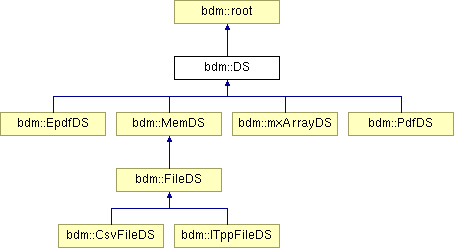bdm::DS Class Reference
Abstract class for discrete-time sources of data. More...
#include <bdmbase.h>
Inheritance diagram for bdm::DS:

Public Types | |
| __VA_ARGS__ | |
| enum | log_level_enums { __VA_ARGS__ } |
Public Member Functions | |
| DS () | |
| default constructors | |
| virtual int | max_length () |
| Returns maximum number of provided data, by default it is set to maximum allowed length, shorter DS should overload this method! See, MemDS.max_length(). | |
| virtual void | getdata (vec &dt_out) const |
| Returns full vector of observed data=[output, input]. | |
| virtual void | getdata (vec &dt_out, const ivec &indices) |
| Returns data records at indices. Default is inefficent. | |
| virtual void | write (const vec &ut) NOT_IMPLEMENTED_VOID |
| Accepts action variable and schedule it for application. | |
| virtual void | write (const vec &ut, const ivec &indices) NOT_IMPLEMENTED_VOID |
| Accepts action variables at specific indices. | |
| virtual void | step ()=0 |
Moves from  to to  , i.e. perfroms the actions and reads response of the system. , i.e. perfroms the actions and reads response of the system. | |
| virtual void | log_register (logger &L, const string &prefix) |
| Register DS for logging into logger L. | |
| virtual void | log_write () const |
| Register DS for logging into logger L. | |
| virtual const RV & | _drv () const |
| access function | |
| const RV & | _urv () const |
| access function | |
| void | from_setting (const Setting &set) |
| void | validate () |
Public Attributes | |
| log_level_template< DS > | log_level |
| vec | dt |
| publicly acessible vector of observations | |
| vec | ut |
| publicly writeble vector of inputs | |
Protected Attributes | |
| int | dtsize |
size of data returned by getdata() | |
| int | utsize |
| size of data | |
| RV | Drv |
Description of data returned by getdata(). | |
| RV | Urv |
Description of data witten by by write(). | |
Friends | |
| class | log_level_intermediate< DS > |
Detailed Description
Abstract class for discrete-time sources of data.The class abstracts operations of:
- data aquisition,
- data-preprocessing, such as scaling of data,
- data resampling from the task of estimation and control. Moreover, for controlled systems, it is able to receive the desired control action and perform it in the next step. (Or as soon as possible).
- input,
 , which are described via RVs in attribute
, which are described via RVs in attribute urv - observations
 , which are described in
, which are described in drvIn simulators, dt may contain "hidden" variables as well.
Member Function Documentation
| void bdm::DS::from_setting | ( | const Setting & | set | ) | [virtual] |
Create object from the following structure
drv = RV({"names",...},[..sizes..]); % decription of observed data using bdm::RV::from_setting
urv = RV({"names",...},[..sizes..]); % decription of input data using bdm::RV::from_setting
log_level = 'logdt,logut'; % when set, both the simulated data and the inputs are stored to the logger
% By default both are on. It makes sense to switch them off e.g. for MemDS where the data are already stored.
Reimplemented from bdm::root.
Reimplemented in bdm::MemDS, bdm::FileDS, bdm::ITppFileDS, bdm::CsvFileDS, bdm::EpdfDS, bdm::PdfDS, and bdm::mxArrayDS.
The documentation for this class was generated from the following files:
- bdmbase.h
- bdmbase.cpp
Generated on 2 Dec 2013 for mixpp by
 1.4.7
1.4.7
